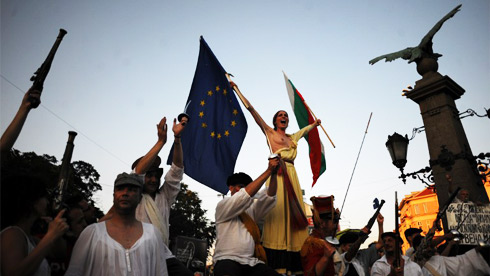Last week about a thousand people held demonstrations outside the German Embassy in Sofia. The rally continued the peaceful spirit that had marked the daily protests against the Bulgarian government – until the violent escalation on its 40th day on the night of [July] 24: As a thank you to the German Ambassador, the demonstrators recreated the Fall of the Wall of 1989. Together with the French Ambassador, the ambassador had published an article in one of Bulgaria’s largest newspapers, in which both diplomats openly expressed their sympathy with the protesters, who gathered in their thousands every evening in Sofia and denounced the government as a “Mafia”.
The central message of this “unusual and outrageous act”– in the words of the outraged Bulgarian government – is: “Membership in the European Union is a decision meant to civilise a state. The oligarchic model is not compatible with that, neither in Bulgaria nor elsewhere.”
This content has been removed under request of the copyright owner.
European Institutions
Sanctions to defend fundamental rights?
What if the EU is preparing an "exemplary gesture to convince European citizens that it actually serves a purpose and that it can support principles and act when necessary?" asks Romanian daily Adevărul.
The paper's Brussels correspondent explains that a document was recently sent to the College of Commissioners promoting the idea that the EU must "debate more often, beyond economic issues, on the manner in which member states apply the regulations of the rule of law and must ensure the respect of fundament rights".
It is therefore possible, says Adevărul, that the EU will from now on aim to "start a [disciplinary procedure] against some member states, through the mechanism stipulated in Article 7 of the Lisbon Treaty”, this would deprive the country in question of certain rights accorded by the treaties.
This could have "a very interesting impact in the autumn when the merciless battle for the European elections scheduled for May 2014 begins," writes the paper, adding –
The answer to the sanctions question, which can be found somewhere between a violation procedure and Article 7, is not only a spectacular political bomb [...] It is also a strong message that can raise the credibility of European institutions. The aim is to prove that the European project itself is viable.
Was this article useful? If so we are delighted!
It is freely available because we believe that the right to free and independent information is essential for democracy. But this right is not guaranteed forever, and independence comes at a cost. We need your support in order to continue publishing independent, multilingual news for all Europeans.
Discover our subscription offers and their exclusive benefits and become a member of our community now!












